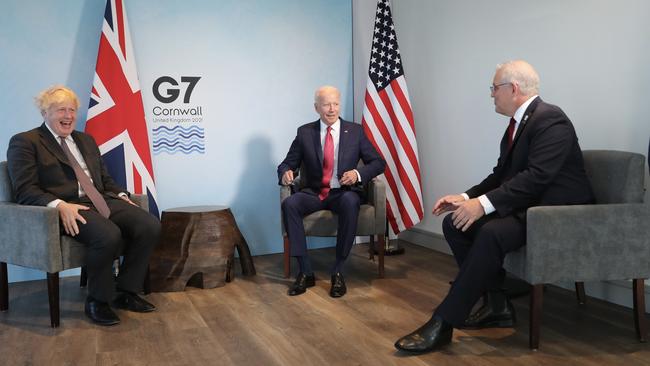Australia a crucial hub for NATO in Asia

Having the US, Japan and the big European democracies on board will provide much needed moral and practical support for Scott Morrison’s determination to resist Beijing’s economic and diplomatic coercion.
True to his word, US President Joe Biden has begun the process of bringing together a coalition of like-minded countries. His aim is to rejuvenate the democracies, underline their shared values, restore US leadership and strengthen US competitiveness in the contest with China to define the rules and values of the emerging world order. Achieving these ambitious goals won’t be easy.
Although Europe’s China scepticism has grown, Germany and France don’t want to outsource their economic or China policies to the US. This is despite relief that they no longer have to deal with Donald Trump’s transactional unilateralism and disdain for the co-operative multilateralism Biden champions.
Italy, another G7 member, was the first major European state to join Chinese President Xi Jinping’s signature Belt and Road Initiative. Much will depend on Biden’s diplomatic skills and ability to offer an attractive alternative to Xi’s Sino-centric offerings.
A cornerstone of the new edifice that Biden wants to construct is an infrastructure initiative for developing countries, Build Back Better World. B3W is billed as “a values-driven, high standard and transparent infrastructure partnership” to help narrow the $40 trillion infrastructure needs of the developing world. If successful, B3W could provide an antidote to Beijing’s debt diplomacy and demonstrate a new-found resolve to work in partnership with the developing south, a crucial battleground for influence that China is winning.
B3W will be rolled out at a time the BRI is running into headwinds. Criticised abroad for creating vassal states, exploiting poor countries and advancing Beijing’s military and geopolitical interests, BRI has attracted domestic ire for spending money on foreigners at the expense of China’s citizens.
But will there be enough money on the table to present a genuine alternative to Xi’s $US1 trillion ($1.3 trillion) BRI investment, which has nearly a decade start? To wrest back the initiative from Xi, Biden seeks to recast the virtues of liberal institutionalism for a changed world where dictatorships of the left and right are ascendant and democracies are widely seen as in decline.
Biden hopes to reverse this democracy deficit by uniting the democracies around a reimagined Atlantic Charter, the foundational document of the post-World War II liberal order. Conceived by US president Franklin D. Roosevelt and British prime minister Winston Churchill four months before the Japanese attack at Pearl Harbor in 1941, during one of liberal democracy’s darkest periods, the Atlantic Charter outlined an inspirational vision for an open, just and stable world.
The democracy brand is defined by its unique blend of power and idealism. It aims to make the world a better place. But that won’t be possible unless Biden’s refreshed charter addresses the reasons for the fraying liberal order and acknowledges the strength of the external challenge from authoritarian states.
A contemporary version of the charter will likely include in its principles the protection of fundamental human rights under the rule of law; the belief that just governments derive legitimacy from the consent of the governed; that all people have the right to live in peace, free from threats of aggression; that all must have equal opportunity to share in the benefits of national prosperity and to a safe and healthy planet; and that collective action is necessary to protect the liberal order from coercion, interference and tyranny.
These principles are likely to be enthusiastically endorsed by the Morrison government along with a third Biden proposal: transforming NATO from a European to a global security collaboration.
For the past decade there has been talk about establishing an Asian NATO. Nothing eventuated because NATO seemed an uncomfortable fit for Asia. Europeans showed little willingness to put money or hard power into a region distant from their main security concerns. Asians bridled at the suggestion their former colonial powers had legitimate military interest in a region they once exploited for their own ends.
But NATO enlargement has renewed momentum because China and Russia are interfering with democracies globally. So the defence of democracy must be a global endeavour. It will need to be underpinned by hard power to match the enormous increase in military spending by Beijing and Moscow during the past two decades, which is tilting the military balance in their favour.
NATO would bring an established defence network and command structure to Asia, decades of operational experience and military capability. This would signal to China that further adventurism will be met with collective action that potentially includes European and regional democracies.
Given the likely increase in European deployments to the region and need for a safe place to resupply, repair and host visiting ships and aircraft, Australia is well positioned to become a crucial hub for an enlarged NATO. We should do all we can to help Biden renew the democracy project.
Alan Dupont is chief executive of geopolitical risk consultancy the Cognoscenti Group and a nonresident fellow at the Lowy Institute.



The Group of Seven meeting in Cornwall may well be a turning point in the democratic push back against China’s competing brand of assertive authoritarianism.